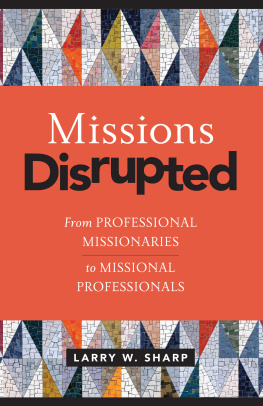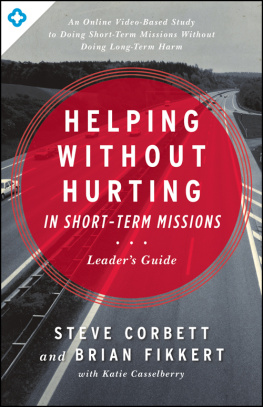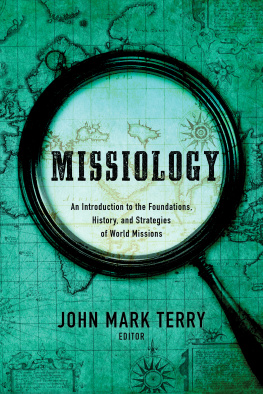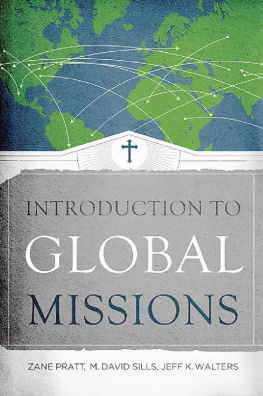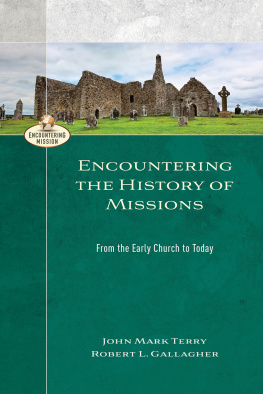Dedicated to the poor and needy the world over, whom Jesus calls by name.
List of Contributors
JoAnn Butrin , PhD, director of International Ministries for Assemblies of God World Missions and adjunct faculty at Assemblies of God Theological Seminary in Springfield, MO. She served as a missionary to central Africa and is the author of From the Roots Up .
Brian Fikkert , PhD, Professor of Economics and Community Development at Covenant College in Lookout Mountain, Georgia. He is also founder and president of the Chalmers Center and co-author of the best-selling book, When Helping Hurts .
Jeff Hartensveld , director of mobilization for Assemblies of God World Missions and served many years as a missionary to Indonesia.
Lynda Hausfeld , missionary in Muslim contexts for over twenty-five years, and International Director for Say Hello, a ministry of Global Initiative. She also teaches Spanish at Evangel University in Springfield MO.
Karen Herrera , RN, MSN, missionary with Health Care Ministries and contributing author for the Hands that Heal Community Curriculum with the Faith Alliance against Slavery and Trafficking (FAAST).
Suzanne Hurst , BSN, MPH, DrPH (Candidate), missionary to Central Africa where she has served for years working with local churches on community development initiatives.
Jerry M. Ireland , PhD, missionary to sub-Saharan Africa, director of Africa AG Care. His publications include Evangelism and Social Concern in the Theology of Carl F. H. Henry .
Paula Ireland , MA, MPH, missionary to sub-Saharan Africa and director of the Cry Africa Network, which helps local churches respond to the HIV/AIDs crisis.
Alan R. Johnson , PhD, missionary to Thailand and author of Apostolic Function in st Century Missiology . In addition, he has authored numerous scholarly articles on frontier missions.
Jean Johnson , long-time missionary to Cambodia and currently executive director of World Missions Associates (WMA). Her publications include We Are Not the Hero: A Missionaries Guide to Sharing Christ, Not a Culture of Dependency .
Jeff Palmer , executive director of Baptist Global Response, a Southern Baptist relief and development agency working closely with the International Mission Board of the Southern Baptist Convention.
Jason Paltzer , PhD, MPH, Global Health Director, Kingdom Workers, assistant professor of public health at Grand Canyon University and has served as a missionary in southern Africa.
A. Chadwick Thornhill , PhD, Chair of Theological Studies at Liberty University School of Divinity. His publications include The Chosen People: Election, Paul, and Second Temple Judaism and Greek for Everyone: Introductory Greek for Bible Study and Application .
Brandy Tuesday Wilson , MACM, DMin (Participant), Coordinator for ServeJustice, a team of Nurture Hope, with International Ministries in the Assemblies of God. She served as a missionary in Latin America and Europe before accepting her current assignment.
**Special thanks to Laverne Smith and John Higgins for their editorial work on this project.
Part 1
Introduction
Jerry M. Ireland
P erhaps more than ever before
Some missions agencies have also witnessed an astonishingly sharp increase in new missionary candidates and short-term mission teams interested primarily or solely in social justicewhich has become something of a catch-all term for all things related to compassion. Others have noticed an increase in giving toward relief and development type ministries, while funds going to evangelism and discipleship have declined. Yet, when compassionate missions stand apart from evangelistic efforts and apart from the work of the local church, the uniquely redemptive role of the church is either diminished or lost altogether. Therefore, missionaries must find ways to engage in compassion in ways that are more directly linked to the evangelistic calling of the church. The biblical paradigm is one in which word and deed are not two separate tracks of ministry, but rather are inherently connected and interwoven.
This book is designed to help bridge the gap that sometimes exists between compassion and evangelism. To accomplish this, we not only address the theoretical and biblical principles of compassion in what we hope is a sound and somewhat expansive manner (part one), but also provide some practical guidelines intended to help missionaries navigate the difficult terrain of compassionate missions (part two).
All of the contributors to this volume have at least one advanced degree related to the topic they address. This formal training is buttressed by years of hands-on experience. Together they have well over two hundred years of missions involvement. They have worked in Asia, Africa, Europe, the Middle East, and Latin America. As they have traveled the globe and taught on compassion in missions and worked with local believers to build healthy churches that exhibit a robust understanding of Gods own concern for the poor and marginalized, they have found themselves searching in vain for a single volume that addresses both the theoretical and practical side of compassionate missions. This book was born out of that search.
Another reason for this text is that dominant issues in compassionate missions change frequently, and not always for good reasons. Not long ago, HIV/AIDS and orphans were a primary concern. Nearly every evangelical church in the United States had heard of Heidi and Rolland Baker and their ministry to street children in Mozambique. In early 2015 , as this book was being written, the Ebola crisis in West Africa and its once non-stop coverage by Western news outlets had begun to fade. At the same time, human trafficking had been a dominant focus of evangelical compassionate missions for at least a decade.
Another reality that presses the need for this text centers on the fact that evangelical missionaries have not always done a good job of integrating compassionate work with the national and local churches in the country where they serve. Because of this, we are forced to ask some searching questions. Are our compassionate efforts in missions driven by real needs and by biblical mandates, or by whatever captivates our attention? Do we engage in compassionate ministries out of a need to feel good about ourselves or out of a clear understanding of what the Bible teaches? Does the manner in which we conduct compassionate missions focus on the needs of those we are helping or on their assets? Do we involve those we seek to help in the process, or do we merely presume to know what they need and forge ahead? What is the difference between compassionate work done by missionaries and that done by any number of Non-Governmental Organizations (NGOs) and parachurch organizations? Should there be a difference? These are questions every missionary working in compassionate ministry should take the time to consider and work through, and this volume has been conceived with these very questions in mind. We have made a conscious attempt to not be driven by the ever-changing and fickle winds of a consumer culture, but by realities that we know, from first-hand experience, directly impact the task of reaching the lost for Christ.
Overview
Part one of this text focuses on guiding and foundational principles. In chapter , Jerry Ireland explores the theological foundations for compassion through a study of the biblical concept of the kingdom of God, wherein compassion constitutes a fundamental aspect of what it means to be the people of God. He then looks at how this biblical understanding should inform the praxis of missionaries and the flourishing of indigenous local churches. Following this, Alan Johnson further develops the idea of how compassion can be done according to indigenous principles. Following Ralph Winter, he distinguishes between the marks of the church and the purpose of the missions band, noting important differences in purpose and function. In chapter , JoAnn Butrin and Chad Thornhill articulate social and biblical definitions of poverty. They adopt the widely held view that poverty should be defined by more than economic factors and set the definition within a scriptural framework. Rounding out part one of the text and this section on guiding principles, Suzanne Hurst introduces the essence of a development approach to compassion. Development focuses on the dignity of every person and seeks to avoid the creation of dependency. It also focuses on assets rather than on needs.


